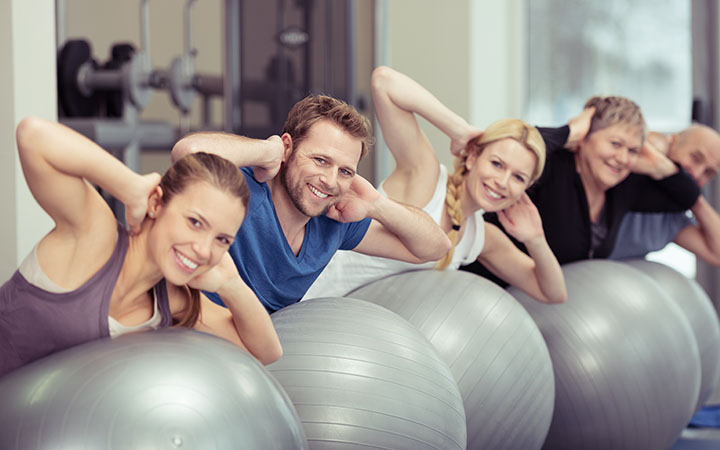Exercise and Happiness: An Under-Discussed Secret
The link between exercise and happiness is already well established, but the importance of this link is not.
For those interested in understanding what contributes to a joyful life, I would argue an absolute imperative is regular exercise as the scientific literature seems comprehensive in its findings.
Often, we discuss philosophical principles, habits of thinking, and daily practices that happy individuals consistently engage in to lean towards more long-term joy. Eons of religious and spiritual traditions have discussed the psychology of an awakened or ‘realised’ individual, none of which have pointed to this secret.
The secret of exercise.
At our physiotherapy clinic in Crawley, we advise everyone on the importance of regular exercise.
Why? A perfect example: the other day we had an elder gentleman come into our clinic to pick a client up, we struck up a conversation and I couldn’t help notice how sharp he was in his conversation, his memory was crystal clear, his mobility appeared perfect.
He told me he’s never once had an issue with lower back pain, an issue that affects most people in the world.
“How did you manage that?!” I splurged out accidentally. His response shouldn’t have surprised me:
“I’ve always kept active”.
An ex-army member, aged now at 75 committing to 30-45 minutes of yoga every single morning, I thought, there’s something to be taken away here.
Of course, we cannot directly implicate correlation to causation in this particular case, but this gentleman’s story reflects wonderfully what science is now telling us in spades.
It made me think, often we know exercise is importance to maintain general good health, but the real benefits can also be found in its accumulative impact, when we reach our later years – arguably when it’s also more important to maintain mobility than ever.
Exercise and Happiness: An Evolutionary Take
We know that exercise stimulates hormones in the brain related to pleasure and happiness, and we can discuss this more later in this article.
That being known, however, it’s only natural to then wonder, why?
Why is it our brains would reward us emotionally for exercise?
I propose that the need for exercise is ingrained in our body and brains’ evolution as homosapiens.
Studies from the University of Arizona have recently discussed the notion that about 2 million years ago, as our species had new requirements that they had to adapt to, known as the ‘hunter-gatherer’ era, that physical exercise was a requirement for survival. As a result, we engaged in activities that were mentally stimulating as well as physically demanding, resulting in a required link between brain and body.
In addition, Dr Daniel E. Liberman discusses how previous populations of the paleolithic era had steady and only mild changes in cases of infectious disease as well as chronic diseases, however as we began to enter the farming and industrial era, these rates drastically increased.
His fascinating presentation on this topic can be viewed here:
At 11 minutes into the video you will see the chart showing a spike in disease rates with the new eras – and one thing that went along with both these eras was a significant decrease in physical activity.
His paper, as showed above, sums up his thoughts on the topic:
“Many lines of evidence indicate that humans evolved to be adapted for regular, moderate amounts of endurance physical activity into late age. However, because energy from food was limited, humans also were selected to avoid unnecessary exertion, and most anatomical and physiological systems evolved to require stimuli from physical activity to adjust capacity to demand. Consequently, selection never operated to cope with the long-term effects of chronic inactivity.”
How Exercises Increases Happiness
We have discussed how exercise may have been an evolutionary adaptation we had millions of years ago due to our new environment demanding more from us, resulting in us engaging in complex activities that were mentally and physically demanding.
It could be suggested therefore that this resulted in our brains perceiving pleasure from physical activity, as we hunted and gathered our food and needs using moderate to high physical exertion to maintain our own existence.
Following this, we can now appreciate that exercise is not simply a ‘hack’ to make us feel better on a bad day, but instead a lifestyle choice we need to return to for a radiant life.
Then the next question to ask is, how exactly does exercise result in more feelings of happiness and pleasure.
1. It release endorphins, serotonin and Brain-Derived Neurotrophic Factor (BDNF)
Endorphins are released when the body comes under physical stress. Research has found these hormones bind to opioid receptors in the brain, meaning they act in the same way morphine does, and thus acts as a potent natural painkiller.
Serotonin, sufficiently summed up by Medical News Today:
‘…is thought to be especially active in constricting smooth muscles, transmitting impulses between nerve cells, regulating cyclic body processes and contributing to wellbeing and happiness”.
BDNF is a protein released during exercise and it has an important (evolutionary) function which Buffer explains in detail:
“If you start exercising, your brain recognizes this as a moment of stress. As your heart pressure increases, the brain thinks you are either fighting the enemy or fleeing from it. To protect yourself and your brain from stress, you release a protein called BDNF (Brain-Derived Neurotrophic Factor). This BDNF has a protective and also reparative element to your memory neurons and acts as a reset switch. That’s why we often feel so at ease and things are clear after exercising and eventually happy”.
2. It reduces cortisol and adrenaline
These are stress hormones and in high quantities are negative for the body. Harvard found that aerobic exercise especially will decrease levels of cortisol and adrenaline, resulting in less stress.
3. It improves your self-esteem
People inherently know that exercise is good for us and we should do it regularly. For those who feel the pull to run, jog, play games, sports or other activities know how good it makes them feel after the training session is finished.
Research has found that regular exercise results in an increase in self-esteem in women, which in turn results in a plethora of other benefits in our mood and behaviour.
PsyCentral also reported a study which found an increase in self-esteem in overweight kids from exercise.
It’s not harmful also knowing that exercise also has a positive impact on:
- Working memory
- Concentration
- Ageing
- Cognitive decline
- Overall mental health
- Coordination
- Strength
- Mobility
- Flexibility
- Help control addiction
- Productivity
- Pain tolerance
Recommendations for General Exercise
Often, the word ‘exercise’ is mistaken to mean heavily intensive activities that result in you feeling like you can’t walk by the end of it.
Truthfully, exercise is: “Activity requiring physical effort, carried out to sustain or improve health and fitness”.
With this definition, there are an infinity of activities that you could do to start exercises.
The key principles, however, of effective exercise, are:
1. Exercise regularly
Most government recommendations advised 3-5 days per week of 30-60 minutes. This is a great start if this is what your schedule can only afford.
But historically, we would be walking, jogging, running, hunting and gathering, most of the day, every day.
Don’t be scared to engage in light-moderate exercise for over an hour every day of the week. You’ll benefit from it.
Intensity weight training would benefit from restriction, as too much can lead to injury and long term muscle or joint damage.
But light to moderate exercise is less risky and therefore you can be open in your approach to how much you engage in.
2. Exercise outdoors
Exercising outdoors has been shown to have positive benefits against exercise indoors:
- Decreased stress
- Decreased anger
- More vitality
- Sense of aliveness, enthusiasm and energy
- Decrease in tension, depression, confusion
- Help reach your required vitamin D levels (which you can’t do indoors).
3. Do something fun
Seeing as exercise is anything that involves physical activity, be sure to not think you have to run or go for long walks (unless you enjoy this, then by all means go ahead!).
It also means, sports, games, housework, gardening.
Think about what you enjoyed playing as a kid or at college/university.
Are there any local clubs you can join that you can engage in weekly? This will also give you a timetable to work with, so you know you’ll be exercising regularly.
To supplement this you could then think about what lifestyle habits you could change to incorporate exercise into your daily routine. For example, could you walk instead of driving to work? Could you use the elevator instead of stairs?
If you travel a lot abroad, simply walking around the airport instead of using all the escalators around the airport can help you get in that extra exercise.
Exercise should be fun, meaningful and purposeful and any manner in which you can squeeze it into your day to day life can add to long term happiness, wellbeing and health.

Physiotherapy BSc MCSP HPC PAS
Founder of Crawley Physiotherapy Clinic
HCPC Registration Number PH97986
CSP Registration Number 089576

